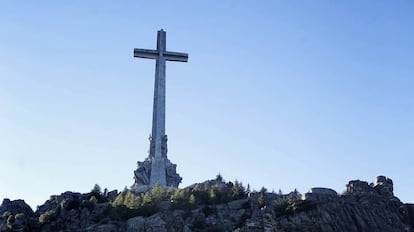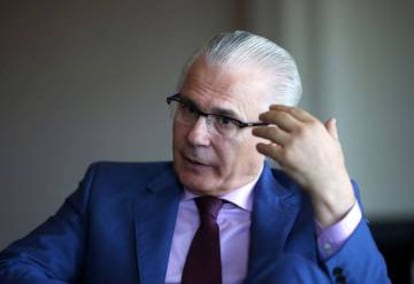Spanish Court dismisses appeal by ex-judge to remove Franco’s remains
Baltasar Garzón wants government to transfer the dictator’s coffin from the Valley of the Fallen
The Spanish Supreme Court has dismissed an appeal by former crusading judge Baltasar Garzón to have the remains of General Francisco Franco removed from a basilica in the Valley of the Fallen, outside Madrid.

The move feeds into an ongoing dispute about the status of the huge monument in the mountains 70 kilometers northwest of Madrid, which is seen by some in Spanish society as a tribute to the military dictator who ruled Spain for four decades, while conservatives – including the ruling Popular Party (PP) – deny this claim.
Last month, the opposition Socialist Party (PSOE) called for the remains of Franco to be moved, and introduced a non-binding resolution in Congress requesting the creation of a truth commission to investigate the Franco years (1939-1975).
Garzón was also the original judge on the Gürtel bribes-for-contracts case
The initiative seeks to push ahead the development of the Historical Memory Law passed in 2007 by the previous Socialist administration of José Luis Rodríguez Zapatero in an effort to provide moral redress to the victims of both the Civil War (1936-1939) and the ensuing dictatorship.
Garzón, who gained global notoriety in 1998 after issuing an international arrest warrant for former Chilean dictator Augusto Pinochet, had petitioned the Spanish government to transfer Franco’s remains as well as those of José Antonio Primo de Rivera, founder of the fascist Falange movement.
The petition was filed in November 2015 and rejected by the government of Prime Minister Mariano Rajoy in September 2016. Garzón and two other jurists then appealed to the Supreme Court.
The original claim asked the government to turn the Valley of the Fallen into a “Space for Memory” by eliminating all vestiges of Francoism. Garzón also said the Spanish state should apologize to the victims of the Civil War and the victims of the Franco years.

Additionally, the government was asked to allocate enough money to exhume and identify the remains of the more than 33,000 victims who are estimated to be buried at the Valley of the Fallen, and to publish their names.
This was not Garzón’s first attempt to tackle the legacy of the Spanish Civil War – a thorny subject that Spanish politicians of the late 1970s agreed not to discuss as they embarked on a peaceful transition to democracy. In late 2008, Garzón, who was then a judge at the Audiencia Nacional, Spain’s central High Court, ordered several mass graves opened as part of an investigation into “crimes against humanity” committed by the Franco regime. But prosecutors questioned his jurisdiction and Garzón then found himself standing trial, although he was acquitted of all charges.
Garzón was also the original examining judge on the Gürtel case, a massive bribes-for-contracts scheme that he began investigating in early 2009 and which is now resulting in the first convictions against the main defendants.
The then-judge, however, was taken off the case in 2010 and ultimately barred from the bench for 11 years over his orders to wiretap suspects’ conversations while in preventive detention. International analysts have described this as politically motivated action against the judge.
The Spanish jurist was later hired by WikiLeaks founder Julian Assange to head his own legal team.
English version by Susana Urra.
Tu suscripción se está usando en otro dispositivo
¿Quieres añadir otro usuario a tu suscripción?
Si continúas leyendo en este dispositivo, no se podrá leer en el otro.
FlechaTu suscripción se está usando en otro dispositivo y solo puedes acceder a EL PAÍS desde un dispositivo a la vez.
Si quieres compartir tu cuenta, cambia tu suscripción a la modalidad Premium, así podrás añadir otro usuario. Cada uno accederá con su propia cuenta de email, lo que os permitirá personalizar vuestra experiencia en EL PAÍS.
¿Tienes una suscripción de empresa? Accede aquí para contratar más cuentas.
En el caso de no saber quién está usando tu cuenta, te recomendamos cambiar tu contraseña aquí.
Si decides continuar compartiendo tu cuenta, este mensaje se mostrará en tu dispositivo y en el de la otra persona que está usando tu cuenta de forma indefinida, afectando a tu experiencia de lectura. Puedes consultar aquí los términos y condiciones de la suscripción digital.








































